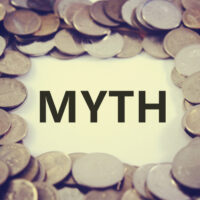Myths about Bankruptcy, Debunked

Bankruptcy is a topic that is shrouded in some mystery in popular culture. Many Americans hold numerous misconceptions about how bankruptcy works, whether it is a cure-all to their debt problems, or whether it will have permanent and irreversible effects on their financial health. Learn more below about the truth behind myths that are commonly associated with bankruptcy, and speak with a knowledgeable New York bankruptcy attorney about additional questions.
Myth: Bankruptcy will destroy your ability to obtain credit
Many people with serious debt are scared to file for bankruptcy, despite falling further and further behind on their bills, because they fear being unable to obtain a credit card or car loan in the future with a bankruptcy on their record. It is true that a Chapter 7 bankruptcy will appear on your credit score for ten years, and a Chapter 13 for seven. That said, many bankruptcy petitioners are nevertheless able to obtain credit far sooner than seven years after completing their petition. Not being able to keep up with your bills and missing payments will also cause your credit score to suffer. While a bankruptcy filing will eventually improve your credit by wiping away the overwhelming consumer debts you carry, continually falling behind on bills will only make your credit worse.
Myth: Bankruptcy will eliminate all your debts
Chapter 7 can eliminate your unsecured consumer debts, but personal or secured debts such as income taxes, child custody, and loans associated with physical property such as a home or car will remain in place. However, when you file for bankruptcy, an automatic stay will be put in place, allowing you to hold off paying these loans while your bankruptcy is pending. Filing for bankruptcy can also offer you an opportunity to renegotiate your payment plans on any debts that aren’t eliminated through bankruptcy.
Myth: Bankruptcy will result in you losing all your valuable possessions
Some people hesitate to file for bankruptcy out of fear that the bankruptcy court will seize their most valuable property to pay off their debts. On the contrary, bankruptcy petitioners receive exemptions that they can use to shield their most important property from seizure. In fact, most Chapter 7 bankruptcy filings are no-asset cases, meaning that the bankruptcy court doesn’t take any of the debtor’s property during their case. In all likelihood, you’ll be able to retain the property that you’ll be able to afford to keep after your case is complete.
If you have questions about whether filing for bankruptcy in New York could be right for you and your family, contact the experienced and dedicated Hudson Valley bankruptcy attorneys at Rusk, Wadlin, Heppner & Martuscello, LLP for a consultation, at 845-236-4411 (Marlboro), or 845-331-4100 (Kingston).

